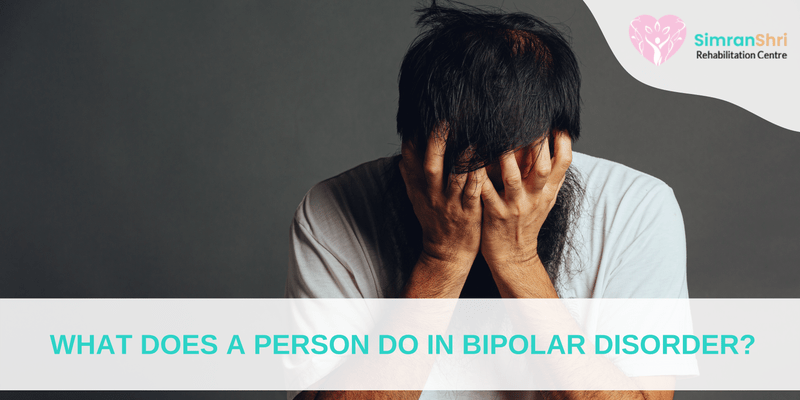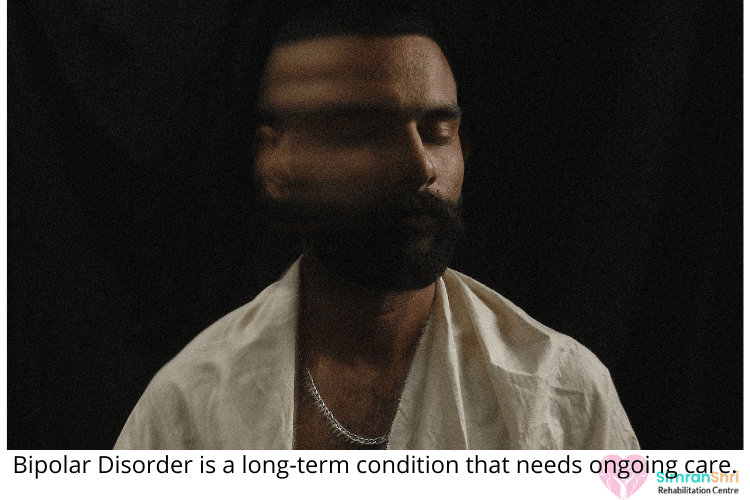

Bipolar disorder is a mental health disorder characterized by manic high to depressive low mood episodes. This condition could occur due to altered brain structure, genetics, and environment. Individuals suffering from bipolar disorder experience both episodes of mania and depression, including excitement, overwhelming joy, energy, happiness, reduced inhibitions and the Need for sleep. No two people with bipolar disorder experience the same signs and symptoms or have a common diagnosis. An episode might last from days to months and include suicidal ideation, especially during the depressive episodes. It becomes essential for individuals to seek bipolar disorder treatment to manage their condition. Lifelong management helps individuals lead a healthy and productive life without major inconveniences.

Here are a few types of bipolar disorder:
Bipolar I Disorder: an individual exhibits extremely erratic behaviour and has severe manic episodes that require medical care and urgent Mental Health Disorder Treatment, lasting at least a week. Depressive periods also occur that last for a minimum of two weeks.
Bipolar II Disorder: although not as extreme as bipolar I, it too has manic and depressive episodes.
Cyclothymic disorder: These manic and depressive episodes last for a minimum of two years in adults and one year in adolescents and children. The symptoms are not as severe as that of bipolar I and bipolar II. “Other specified” or “unspecified” bipolar disorder is used to describe the type of bipolar disorder where a few energy or mood symptoms are experienced but do not last for a time enough to be categorized as an episode.
Rapid cycling is the course of illness in individuals suffering from bipolar I or bipolar II. This is when four to five episodes are observed within one year. It can occur during bipolar disorder and is more common in women than in men. Depressive episodes and symptoms and suicidal ideation are majorly experienced during rapid cycling.
Drug or alcohol abuse increases the frequency of any bipolar disorder. If an individual struggles with substance use disorder and bipolar disorder, they require a dual diagnosis treatment that addresses both the disorders simultaneously.
There is no set pattern of the high and low episodes in bipolar disorder. An individual might experience a state several times before turning to the opposite mood. These episodes can last for weeks or months, sometimes even years. The severity of the episodes vary individual to individual; it may also vary over time, becoming more or less severe.
Bipolar disorder symptoms of manic episodes (high):
● Sudden changes from being irritable to being joyful
● Rapid speech
● Reduced Need for sleep
● Increased impulsiveness
● Making unrealistic plans
● Poor judgement
● Easily distracted
● Extremely high sex drive
● Loss of appetite
● Increased energy
● Excessive hopefulness, happiness, and excitement
● Restlessness
● Poor concentration
● Drug and alcohol abuse
● A large sense of self-confidence and well-being
Bipolar Disorder Symptoms of depressive periods (lows) :
● Losing interest in things once liked
● Loss of energy
● Sadness
● Losing or gaining weight
● Feelings of worthlessness or hopelessness
● Forgetfulness
● Irritability
● Low sex drive
● Trouble concentrating
● Uncontrollable crying
● Increased Need for sleep
● Issues in decision making
● Talking slowly
● Inability to feel pleasure
● Thoughts of death
● Insomnia
● Attempting suicide
Bipolar disorder is treatable; it just needs ongoing care and lifetime management. Even if individuals have a dual diagnosis and severe forms of bipolar disorders, they can still recover and lead a healthy life.
The treatment makes a huge difference. With a combination of medical assistance, medications, psychotherapy, lifestyle modifications, and support from loved ones- an individual can feel better. There are plenty of individuals leading a healthy and productive life while dealing with bipolar disorder.
Medication
The primary treatment for bipolar disorders is medications. These commonly include:
● Mood stabilisers, such as lamotrigine, carbamazepine, valproate or lithium.
● Antipsychotic drugs, such as lurasidone, cariprazine, quetiapine, and olanzapine.
● Antidepressant-antipsychotic drugs, a combination of mood stabilizers and antidepressants.
● Antidepressants.
● Anti-anxiety medications or sedatives like benzodiazepines.
Psychotherapy
Several types of counselling or “talk therapy” are included in the treatment, these include:
● Interpersonal and social rhythm therapy (IPSRT) - Setting up a routine for day-to-day activities such as sleeping, having meals, working etc., helps stabilize one's mood.
● Cognitive behavioural therapy (CBT) - One of the best stress management counselling, helps individuals manage triggers and stress with healthy coping styles; it also replaces negative thoughts with positive ones.
● Psychoeducation - educating loved ones about bipolar disorders can help them offer support when required by those struggling.
● Family-focused therapy enhances one's treatment by building a support system and helping loved ones recognize an episode.
Lifestyle Modifications
Here are a few lifestyle changes that an individual can make at their end to support the treatment and manage their condition:
● Get regular exercise.
● Stick to a schedule for sleeping and eating.
● Recognize your mood swings.
● Seek family or group support.
● Maintain a symptom chart or journal.
● Learn healthy ways to manage stress.
● Indulge in hobbies or sports.
● Don’t turn to alcohol or drugs.
Bipolar disorder is an illness and not a sign of weakness. Do not blame yourself and focus on the future. Getting the right treatment can alleviate symptoms and stabilize your mood. Ongoing treatment is more beneficial than treating issues as they emerge. A bipolar disorder treatment can give you a better understanding of your condition, which helps one manage their episodes better.
Tags: bipolar disorder, bipolar disorder symptoms, bipolar Disorder treatment, types of bipolar disorder